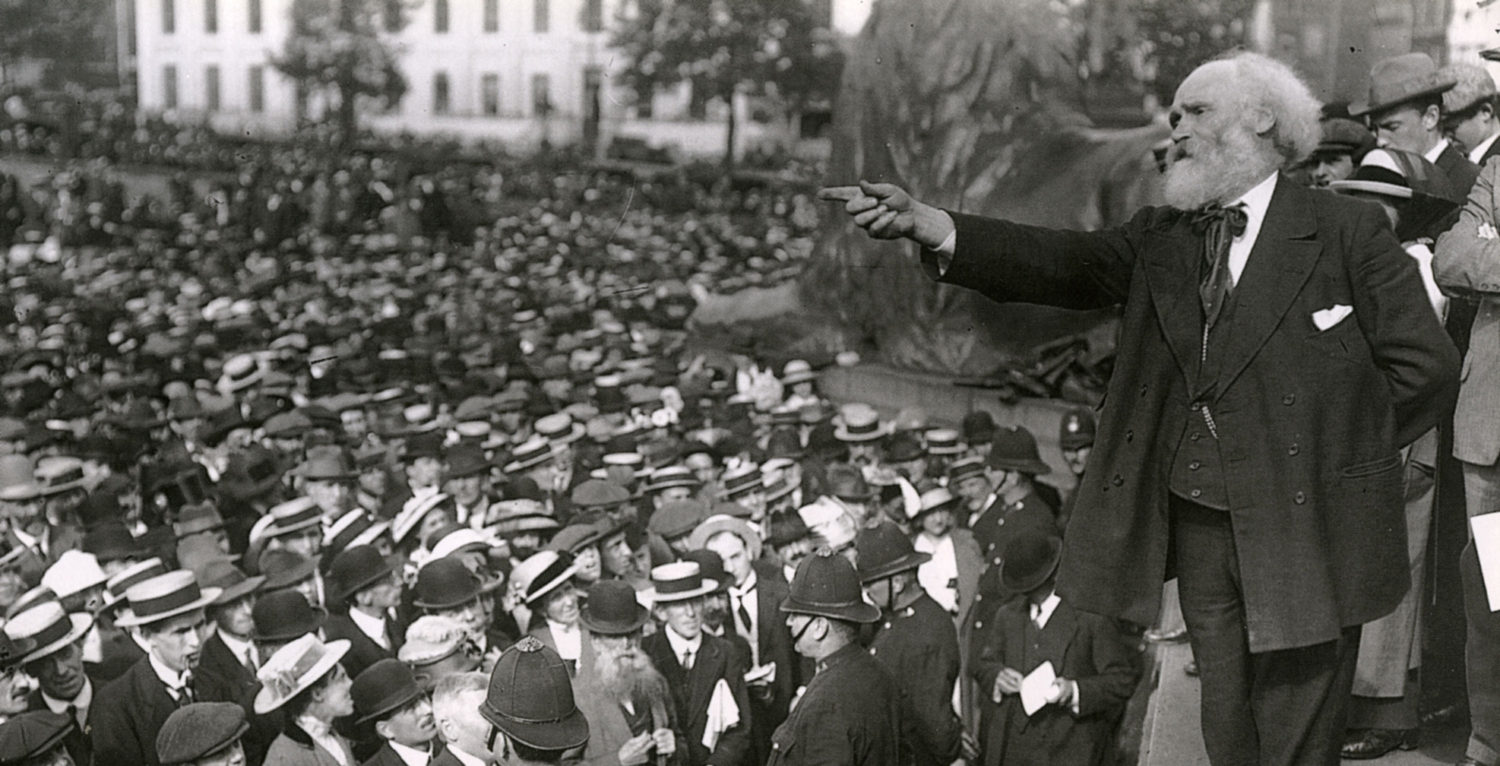From flat caps to flat whites
A gulf has opened up between our politicians and many of those they represent. Luke John Davies looks at how social democracy was gentrified.
In the late 19th and early 20th centuries, an alliance was formed between the working classes and the progressive middle classes across Europe. Here in Britain working class trade unionists like Keir Hardie and JR Clynes stood shoulder to shoulder with their ‘social superiors’ such as the Fabian’s own Sidney and Beatrice Webb. They united around a new-forged political tradition – social democracy – and they made great strides. They brought about welfare states, publicly funded healthcare systems, mass education and a whole host of progressive social changes. Sometimes haltingly, sometimes with reverses, but steadily, gradually, the alliance made the world better. Then something changed.
In the decades since the 1970s the alliance has gone. The working classes (as clunky and complicated as that term now is) are no longer integral to the picture. Social democracy has been thoroughly gentrified.
Thomas Frank, John Curtice, Daniel Allington, Phil Wilson MP and others have all sounded klaxons about the potential consequences. Richard Rorty’s 1997 book Achieving Our Country reads as an eerily accurate prediction of the way Donald Trump rode working class disaffection to power. In Europe too many working class voters turned off by social democracy first seemed to stop voting but then threw their weight behind the likes of Marine le Pen, Alternatuve für Deutschland and of course the Brexiteers.
We can see more evidence of this gentrification in Labour’s performance last year. We lost former working-class strongholds like Mansfield, North-East Derbyshire, Stoke South, Walsall North and Copeland – all Labour since 1935 or earlier. Working class Tory support turned a swathe of once safe seats in the North and Midlands into vulnerable marginals; seats like Hartlepool, Darlington, Stockton North, Sedgefield, Bolsover, Newcastle-Under- Lyme, Bishop Auckland, Barrow and Furness, Ashfield and Dudley North. At the same time we won seats traditionally seen as affluent and middle-class such as Kensington and Canterbury.
It is not just our voters who are becoming gentrified. The parliamentarians and the party’s focuses are as well. These are of course self-reinforcing phenomena. The people the working class encounter every day who make their lives worse are not the rich but middle-class graduate professionals – the call-centre manager, the job-centre worker, the letting agent. When they look at social democratic politicians they see not themselves but those same middleclass graduate professionals and so they stop supporting them. And as the percentage of middle-class people at the top of the parties increased, their focus switched to issues closest to their hearts and their presentation of the issues was increasingly framed for middle-class sensibilities.
My research is aimed at understanding what factors have driven this gentrification dynamic. In part it can be explained by a shift in the recruitment patterns for social democratic parliamentarians. As trade unions decreased in influence from the 1980s onwards, centre-left parties faced a functional need to replace them as recruiting grounds. The vacuum was filled by party youth organisations which at first supplemented and then supplanted the unions as the place to find prospective electoral standard bearers.
The numbers I have uncovered during my research are startling. Take Germany as a representative example. The proportion of SPD members of the Bundestag after the 1980 election who had previously held a formal role with a trade union was 26.52 per cent. By 1994 that proportion had halved and it has hovered between 12 and 14 per cent ever since. In contrast the proportion of SPD parliamentarians who had previously held a formal role with the party youth wing JUSOS rose sharply from 12.83 per cent after the 1994 election to more than half – 52.90 per cent – in 2017. A similar story is likely happening in other social democratic parties, including Labour. Most modern social democratic parliamentarians did their political apprenticeship in youth or student politics rather than the trade unions. We have far more Wes Streetings than Angela Rayners.
This matters because if you work for a trade union you are paid to do politics. Your outside circumstances don’t matter. Participation in a youth organisation however is entirely voluntary. Its activities are conducted in the evenings and at weekends and it is frequently highly metropolitan (in the UK it is, at the top levels at least, exceedingly centralised in London). So the change in recruitment patterns has effectively barred anyone who does shift work, anyone on a low income, anyone who is a single parent, anyone who is a carer and anyone who lives further from London than about two hours travel from becoming a Labour MP. The pool of potential parliamentarians has increasingly become limited to metropolitan, graduate professionals.
None of this is to criticise any individual parliamentarian. Wes Streeting, a successful veteran of the student politics route, himself experienced poverty as a child as did many others. Their stories are the embodiment of the social democratic dream of working-class parents having middle-class kids. Nobody can question their commitment to improving the lives of the worst off in society and Labour has always had middle-class parliamentarians – not least Clement Attlee. But there used to be a balance – for every Alan Milburn an Alan Johnson, for every Roy Jenkins a Roy Mason. That balance has gone. Graduate professionals have crowded out the likes of their parents from the corridors of power.
This creates groupthink and a narrowing of focus. Most social democrats now subscribe to a Rawlsian progressive liberal perspective focused on an imagined individual, a mindset that unites ’Corbynites’ and ‘Blairites’ alike but which ignores communitarian considerations of how individuals fit together in a diverse community.
You can see this in the way social democrats approach issues such as the regeneration of run-down areas. Labour often focuses on encouraging one employer or industry – often a cool, high-tech one such as green energy or robotics – when time after time we have seen that communities built on one dominant industry sooner or later collapse, from Upper Clyde shipbuilders to Welsh coal miners to West Midlands auto-workers. The thinking pattern is: ‘If I were an unemployed person there, what up-and-coming industry would I want to work in?’ rather than: ‘How can we build a robust, sustainable community with multiple industries so people can specialise in different careers?’ so allowing the area to survive the failure of one employer or sector as well as giving people choice and agency.
The starkest example of this groupthink though is the social democratic obsession with education as the solution to poverty. There is no doubt that education as the route out of poverty works at the level of an individual. But it doesn’t work at a system level. If everyone in the country had a PhD, we would still need somebody to empty the bins each week. Education should be open to all but however necessary it is in itself it is an insufficient response to poverty. Only by ensuring workers in low-skilled jobs such as rubbish collection, hospitality or call-centres have decent pay and conditions alongside an opening up of education will we make major inroads into poverty.
There are very few voices left at the top of social democratic parties with first-hand experience of that kind of low-skilled work beyond a part-time student job. So those workers no longer see themselves reflected in the public face of social democracy and a gulf emerges. Bridging this gap isn’t about winning power. Labour and her sister parties across Europe might occasionally triumph thanks to the votes of the liberal middle classes. But policies will be done to the worst off in our society rather than with them. People are not problems to be solved and resent being treated as such. They are human beings with agency who wish to have a say in their own lives, something they feel they have lost as ‘their’ political parties abandoned them. There is a reason ’take back control’ was the most powerful political slogan of our times.
If social democrats are serious about our historical mission of fighting to help the most disadvantaged in our society the class balance amongst our politicians has to be restored. Otherwise we will be speaking over rather than with those we seek to represent. We might win power. But we won’t be empowering those who need it most.

